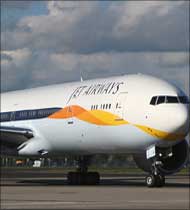For two-and-a-half hours every morning, the Belgian airport of Zaventem turns Indian, signalled in part by a serious spike in the whisky sales of the duty-free shops. Between 8:00 am and 10:30 am, India's Jet Airways dominates the airport's runways with three flights from Mumbai, Delhi and Chennai and another three from New York (JFK and Newark) and Toronto converging in Brussels before flying off in opposite directions again. Up to 2,640 passengers per day are transported between North America and India in this manner, the result of Jet Airways' bold decision to create a hub outside of its home market.
 Hubbing abroad is rare, explains Stefan Hollands, Jet Airways' general manager for the Benelux (Belgium, Netherlands, Luxembourg) region.
Hubbing abroad is rare, explains Stefan Hollands, Jet Airways' general manager for the Benelux (Belgium, Netherlands, Luxembourg) region.
To begin with, most airports are inclined to protect their domestic carriers and are thus unwilling to welcome foreign airlines. For example, Munich would probably prefer not to facilitate the creation of a rival to Lufthansa.
Availability of the requisite number of slots (the five minutes a plane needs to use the runway to take off or land) within a two or three-hour time corridor is another requirement that many well-established airports are unable to meet.
Reeling from the collapse of its domestic carrier Sabena in 2001, Zaventem was, however, a perfect match for Jet. Its new domestic carrier Brussels Airlines did not fly to North America or Asia, making it non-competitive with the Indian airline.
At the same time, the airport was also less busy than its neighbours in Paris or Frankfurt and was, as a result, willing and able to find the gates and slots Jet needed to make Brussels a hub.
"Jet had 800,000 passengers passing through Zaventem in 2008," says Hollands. "Overnight, it (Jet) has made Belgium a gateway to Asia."
Belgium has long felt it lacks the international stature that should rightfully belong to it as headquarters of the European Union.
It is an unexpected twist illustrative of the increasingly powerful forces of globalisation that an Indian airline ultimately helped it to achieve this goal.
Belgian Prime Minister Guy Verhofstadt acknowledged as much in his speech at the launch of Jet Airways at Zaventem airport. "To become a gateway to the world. That is the dream of every ambitious airport. And certainly for Brussels...this ambition hardly seemed feasible. That will change today. Thanks to Jet Airways."
But despite having helped change Brussels' airport's fortunes for the better Jet's own fortunes have been facing some bumpy weather. As at home, the airline's European operations have had some tough months battling the economic recession.
Nonetheless Jet's hub in Brussels has had "some profitable months" claims Hollands without revealing any figures. The hub was set up in August 2007 with the stated aim of becoming profitable within 18 months of operations.
This was achieved according to Hollands although he adds that recent months have been more of a struggle. For July the airline's numbers were down around 35 per cent year-on-year. It was also forced to discontinue its new Bangalore-Brussels route in January this year after only two-months of operations.
But regardless, Jet does have several feathers its cap. The airline has been able to establish itself as the fifth biggest operating out of Zaventem in terms of passenger numbers behind Brussels Airlines, charter companies Jetairfly and Thomas Cook Airlines and Lufthansa. It is also the clear leader in Belgium on all its destinations except Newark in addition to being the largest long-haul carrier at Zaventem.
The next big challenge for Jet in Europe, says Hollands, will be the manner in which it deals with the acquisition by Lufthansa of its code-share partner Brussels Airlines.
The partnership with Brussels Airlines allows Jet to connect passengers to 20 destinations within Europe as well as others in Africa.
However, as of next month, Brussels Airlines will formally become part of the Star Alliance, the grouping that includes Lufthansa. Consequently the agreement between Jet and Brussels Airlines will become impossible to continue unless Jet also agrees to join the Star Alliance.
So far the Indian company has chosen to eschew joining an airline alliance, preferring the room for manoeuver that going-it-alone enables. "At the moment we can choose to work with whomever," explains Hollands, "both United and American for example."
But if it decides to join the Star Alliance, Jet would loose this flexibility and become committed to partnering only with those airlines that are part of the grouping.
"We have to weigh up the pros and cons," smiles Hollands. For the time being and not inappropriately for an airline, this decision remains up in the air.










 © 2025 Rediff.com -
© 2025 Rediff.com -